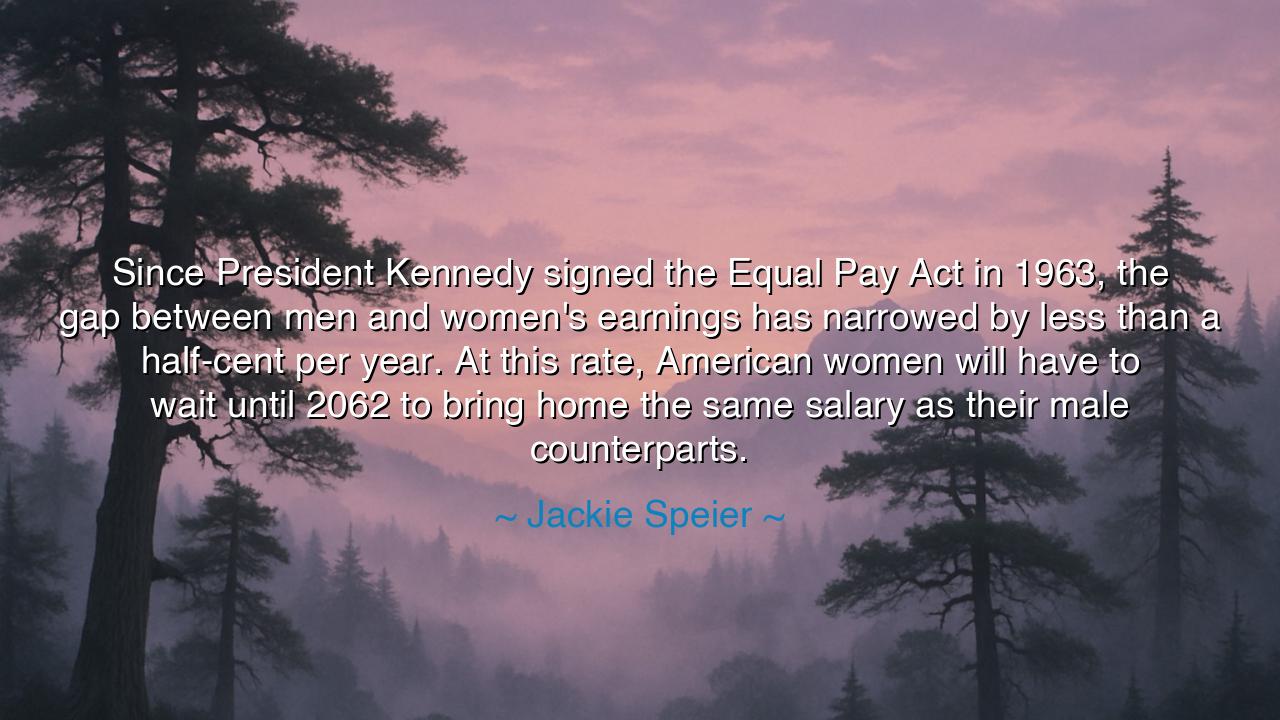
Since President Kennedy signed the Equal Pay Act in 1963, the gap
Since President Kennedy signed the Equal Pay Act in 1963, the gap between men and women's earnings has narrowed by less than a half-cent per year. At this rate, American women will have to wait until 2062 to bring home the same salary as their male counterparts.






In the righteous and resounding words of Jackie Speier, a champion for justice and equality, we hear both a lament and a challenge to the conscience of our age: “Since President Kennedy signed the Equal Pay Act in 1963, the gap between men’s and women’s earnings has narrowed by less than a half-cent per year. At this rate, American women will have to wait until 2062 to bring home the same salary as their male counterparts.” This is not merely a statement of numbers; it is a cry that echoes through generations of labor and struggle. It is the voice of a lawmaker invoking the eternal principle that justice delayed is justice denied, and that equality, if postponed, is a wound that festers in the soul of a nation.
To understand the power of this quote, one must hear the despair and determination beneath its statistics. The Equal Pay Act of 1963, signed by President John F. Kennedy, was meant to usher in a new dawn — a promise that women, who labored beside men, would finally earn equal reward for equal work. Yet, as Speier reminds us, the progress has been painfully slow, creeping forward not with the speed of righteousness, but with the hesitance of a society still captive to its old prejudices. “A half-cent per year,” she says — and in those words lies the weight of millions of women who have been undervalued, underpaid, and unheard. It is a sobering measure of how far we have come, and how far we have yet to go.
The ancients would have recognized the injustice she describes, for the struggle between power and fairness is as old as civilization itself. In the city of Athens, women could not own land, hold office, or even speak freely in the Assembly. Yet history tells of one woman — Aspasia of Miletus, the companion of Pericles — whose intellect and influence secretly shaped the politics of her time. She was praised by Socrates and envied by men, yet even she lived in a world where her worth was measured through the lens of others. So too, modern women, despite their brilliance and toil, often find their value constrained by invisible walls. What Speier reveals is that these walls, though weaker than before, have not fallen completely; they are simply painted over with the illusion of progress.
The origin of her words lies in the ongoing war for gender equality that stretches from the factory floors of the Industrial Revolution to the boardrooms of today. In the 19th century, women like Sojourner Truth and Susan B. Anthony fought for recognition — not only the right to vote, but the right to be seen as economic equals, as human beings of full measure. And in 1963, Kennedy’s pen enshrined that dream in law. But law alone cannot change the heart of a society. Laws open doors; courage must walk through them. Speier’s lament is therefore also a summons — to awaken, to act, to refuse to wait another generation for what should have already been granted.
Her words carry both sorrow and defiance. To wait until 2062 for equality is to accept complacency as destiny. Yet Speier refuses that future. She speaks as the ancients spoke when injustice grew too great — as Demosthenes thundered against tyranny, as prophets cried out against corruption, as mothers and workers across the centuries have demanded dignity. Her voice reminds us that equality is not a favor bestowed






AAdministratorAdministrator
Welcome, honored guests. Please leave a comment, we will respond soon